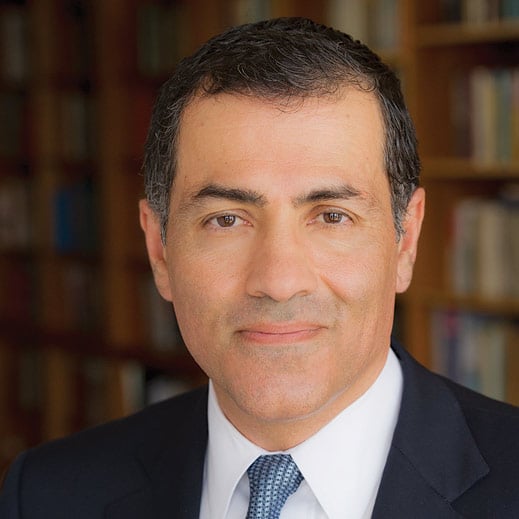When Vali Nasr set out to write his latest book, he knew he would be ruffling feathers. What else would you expect when a former top State Department aide criticizes the foreign policy of the presidential administration he worked for?

“There is a great deal of thirst for this discussion,” Nasr says. “Now that the election is behind us, we have another four years with myriad problems to face—from Syria to North Korea.”
In the book, The Dispensable Nation: American Foreign Policy in Retreat, he argues that the Obama administration’s fear of political backlash and terrorism has crippled diplomatic efforts and led to failing relationships in the Middle East. Publication of the book in April caps a momentous year for Nasr, his first as dean of Johns Hopkins University’s Paul H. Nitze School of Advanced International Studies (SAIS) in Washington, D.C.
Nasr, who was born in Tehran, has deep roots in the Boston academic community. He earned a BA in international relations at Tufts University and then a master’s degree from its Fletcher School of Law and Diplomacy before earning his PhD in political science at MIT. His dissertation on political Islam and Pakistan examined tensions that would figure prominently in the Arab Spring and the increasing influence of Islamic political parties.
“It was a first attempt to look at Islamic fundamentalism not as ideology, but what happens to it when it participates in the political process,” he says.
Nasr was a professor at Fletcher when his 2007 book, The Shia Revival: How Conflicts within Islam Will Shape the Future, led to an appointment in the State Department’s newly created Office of the Special Representative for Afghanistan and Pakistan in 2009. This experience inspired his new book. “The larger aim of the book is to force a debate on where American policy stands today and on the degree of our engagement in the Middle East, in South Asia,” he says.
Since becoming dean at SAIS, Nasr has had less time to publish. He lives with his wife, Darya Nasr, a technology executive, and their three children, sons Amir and Hossein and daughter Donia. In his spare time, he enjoys playing soccer, reading fiction, and spending time with his family.
Even as head of a preëminent U.S. institution of international affairs, he sometimes misses the vibrant intellectual community in the Boston area.
But, he notes, “I don’t miss the winters!”
Keep Reading
Most Popular
Large language models can do jaw-dropping things. But nobody knows exactly why.
And that's a problem. Figuring it out is one of the biggest scientific puzzles of our time and a crucial step towards controlling more powerful future models.
How scientists traced a mysterious covid case back to six toilets
When wastewater surveillance turns into a hunt for a single infected individual, the ethics get tricky.
The problem with plug-in hybrids? Their drivers.
Plug-in hybrids are often sold as a transition to EVs, but new data from Europe shows we’re still underestimating the emissions they produce.
Stay connected
Get the latest updates from
MIT Technology Review
Discover special offers, top stories, upcoming events, and more.